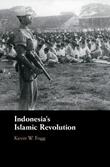Sökning: onr:hztb9x4vfpl4bpjr > Indonesia's Islamic...
- 1 av 1
- Föregående post
- Nästa post
- Till träfflistan
Indonesia's Islamic Revolution / Kevin W. Fogg.
- Fogg, Kevin W. (författare)
- ISBN 9781108487870
- Publicerad: Cambridge ; Cambridge University Press, 2020
- Copyright: ©2020
- Engelska x, 259 sidor
- Bok
Innehållsförteckning
Sammanfattning
Ämnesord
Inställningar
Hjälp
Stäng
- Machine generated contents note: Introduction; 1. Islam in Indonesia before the Revolution; 1.1 Islam in Indonesia at the Turn of the Twentieth Century; 1.2 Divisions within the Muslim Community; 1.3 Trends in the Early Twentieth Century; 1.4 Japanese Occupation; Part I. Islam in Indonesia's War of Independence; 2. Islamic Calls to Action; 2.1 The Reasons for the Revolutionary Struggle; 2.2 Early Fatwas; 2.3 A Flood of Fatwas; 2.4 A Manifesto for the Islamic Revolution: M. Arsjad Thalib Lubis's Toentoenan Perang Sabil; 2.5 Attacks on Islam as Calls for Action; 2.6 Conclusion; 3. Ulama, Islamic Organizations, and Islamic Militias; 3.1 Ulama as Revolutionary Leaders; 3.2 The Mobilization of Islamic Organizations; 3.3 Sabilillah and Hizbullah; 3.4 Islamic Militias in Battle; 3.5 Conclusion; 4. Magic, Amulets and Trances; 4.1 Tradition of Islamic Magic; 4.2 Prayers and Incantations; 4.3 Amulets and Spells; 4.4 Martial Arts and Trances; 4.5 Consequences of Islamic Magic: Fearlessness and High Casualties; 4.6 Conclusions; 5. Social Revolution; 5.1 Meaning of Social Revolution; 5.2 Out with the Old; 5.3 In with the New (and Islamic); 5.4 Social Revolution in Aceh: The Cumbok War; 5.5 Madiun Affair as Competing Social Revolutions; 5.6 Staying Power of Social Revolution; 5.7 Conclusion; 6. Darul Islam; 6.1 Sequence of Events Leading Kartosuwirjo into Rebellion; 6.2 The Darul Islam Movement within the Islamic Spectrum; 6.3 Exceptional Factor: Kartosuwirjo; 6.4 Conclusion; Part II. Islam in Indonesia's Political Revolution; 7. The Jakarta Charter Controversy; 7.1 Creation of the Investigatory Board; 7.2 The Creation of Pancasila and the Jakarta Charter; 7.3 Removal of the Jakarta Charter from the Constitution; 7.4 Implications of the Elimination of the Jakarta Charter; 8. The Creation of Masjumi; 8.1 The Evolving State in 1945; 8.2 Founding an Islamic Political Party: Masjumi; 8.3 Extraordinary Members; 8.4 Masjumi Leadership in 1945; 8.5 Conclusions; 9. The Ministry of Religion; 9.1 Colonial Precedents; 9.2 Establishing a Ministry; 9.3 The Ministry of Religion in Action; 9.4 Conclusions: Importance of the Ministry; 10. Rise of Islamic Socialists; 10.1 Background of the Islamic Socialists; 10.2 Rise in Government and the Party; 10.3 Islamic Socialists and the Masjumi Platform; 10.4 Conclusions; 11. Regional Islamic Parties; 11.1 Masjumi's Geographic Expansion; 11.2 Persatuan Tarbiyah Islamiyah (Perti); 11.3 Regional Political Islam Facing Federalism; 11.4 Conclusion; 12. The Exit of PSII and the First Fracture of Masjumi; 12.1 Standard Narrative of PSII's Exit: Central Power Play; 12.2 PSII's Own Narrative: Regional Initiative; 12.3 Weighing Personal Versus Regional Interests in PSII's Rebirth; 12.4 Conclusions: The Implications of PSII's Exit for Islamic Politics; 13. Islamic Diplomacy; 13.1 Grassroots Islamic Diplomacy; 13.2 Success with the Arab League; 13.3 Diplomatic Milestones; 13.4 Conclusions; Conclusion.
- "The history of the Indonesian Revolution has been dominated by depictions of grassroots fighters and elite politicians who thought of it as a nationalistic or class-based war. In this major new study, Kevin W. Fogg rethinks the Indonesian Revolution (1945-49) as an Islamic struggle, in which pious Muslims, who made up almost half the population, fought and organized in religious ways. Muslims fighting on the ground were convinced by their leaders' proclamations that they were fighting for a holy cause. In the political sphere, however, national leaders failed to write Islam into Indonesia's founding documents - but did create revolutionary precedents that continue to impact the country to this day. This study of a war of decolonization in the world's most populous Muslim country points to the ways in which Islam has functioned as a revolutionary ideology in the modern era."--
Ämnesord
- Indonesiska självständighetskriget 1945-1949 (sao)
- Islam och politik (sao)
- Islam och staten (sao)
- Historia (sao)
- Islam and politics -- Indonesia. (LCSH)
- Islam and state -- Indonesia. (LCSH)
- Islam -- Indonesia -- History -- 20th century. (LCSH)
- Muslims -- Indonesia -- History -- 20th century. (LCSH)
- History (LCSH)
- Islam and state (LCSH)
- Islam and politics (LCSH)
- Indonesia—History—Revolution, 1945-1949 (LCSH)
- Indonesia—History—Revolution, 1945-1949—Campaigns (LCSH)
- Indonesien (sao)
- Indonesia -- History -- Revolution, 1945-1949. (LCSH)
- Indonesia -- History -- 1945- (LCSH)
- 1945- (sao)
Klassifikation
- DS644 (LCC)
- 959.8035 (DDC)
- Koda (kssb/8 (machine generated))
Titeln finns på 1 bibliotek.
Bibliotek i Mellansverige (1)
Ange som favorit- Uppsala universitetsbibliotek, Karin Boye-biblioteket (Uh)Ange som favorit
- Mina lånLåna/reservera
-
- Placering: KURS Teologi Fogg
- 1 av 1
- Föregående post
- Nästa post
- Till träfflistan
Sök vidare
Hjälp
- Fler titlar av
- Fogg, Kevin W.
- Fler titlar om
- 1945-
- Indonesiska självstä ...
- Islam och politik
- Islam och staten
- Historia
-
- Islam and politics
- Islam and politics
- och Indonesia.
- visa fler...
- History
- Islam and state
- Islam and politics
- Indonesia—History—Re ...
- Indonesia—History—Re ...
- Indonesien
- visa färre...
- Online version:
- Fogg, Kevin W., 1983 ...
Sök utanför LIBRIS
Hjälp
- Sök vidare i:
- Google Book Search
- Google Scholar
- LibraryThing
Kungliga biblioteket hanterar dina personuppgifter i enlighet med EU:s dataskyddsförordning (2018), GDPR. Läs mer om hur det funkar här.
Så här hanterar KB dina uppgifter vid användning av denna tjänst.
Copyright © LIBRIS - Nationella bibliotekssystem

